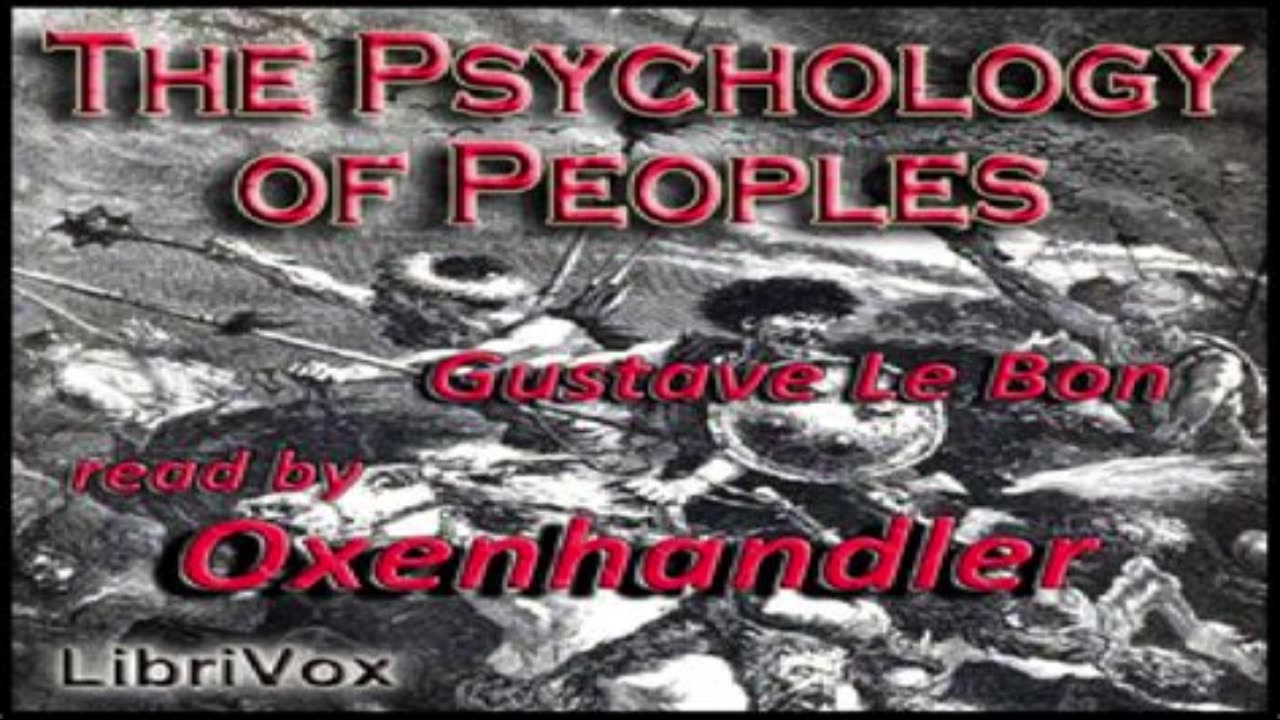Premium Only Content

The Psychology of Peoples: Its Influence on Their Evolution by Gustave Le Bon (1894)
This book is a groundbreaking exploration of how collective psychology shapes the destiny of civilizations. Published in 1894, the book argues that a nation's identity, institutions, and historical trajectory are rooted not merely in politics or economics, but in the deep psychological makeup of its people—what Le Bon calls the soul of a race.
He examines how instincts, traditions, language, religion, and inherited traits mold the behavior of entire populations over generations. Le Bon distinguishes between the psychology of individuals and that of groups, emphasizing that unconscious drives, not rational thought, steer the evolution of societies. His analysis touches on education, government, religion, and war, offering sharp—though at times controversial—critiques of Western civilization, democracy, and cultural decline.
Often considered a companion to his better-known work The Crowd, this book provides the broader framework behind his theories of mass behavior. Where The Crowd focuses on short-term group dynamics, The Psychology of Peoples deals with long-term cultural and civilizational development. Though steeped in the assumptions of its time, Le Bon's insights into group identity, national character, and social inertia remain deeply influential in fields ranging from sociology and political science to propaganda and mass media theory.
About the Author:
Gustave Le Bon (1841–1931) was a French polymath—physician, anthropologist, sociologist, and social psychologist—best known for his pioneering work on crowd psychology and mass behavior. A keen observer of cultural movements and historical cycles, Le Bon was deeply concerned with how irrational forces, tradition, and collective emotion shape societies far more than reason or logic.
He rose to prominence with his influential works such as The Crowd: A Study of the Popular Mind (1895) and The Psychology of Peoples (1894), which laid the foundation for modern social psychology and the study of group dynamics. Le Bon’s theories were widely read—and sometimes controversially admired—by figures ranging from Sigmund Freud and Carl Jung to Mussolini, Hitler, and Roosevelt, all of whom recognized the power of collective belief in shaping history.
While some of his views reflect the racial and cultural biases of his era, his central insights—that mass behavior is driven more by unconscious emotion than by rational thought, and that civilizations rise and fall based on the psychology of their people—remain relevant in analyzing propaganda, political movements, and cultural shifts to this day. Le Bon’s work continues to provoke debate and reflection across disciplines for its bold and unsettling clarity.
-
 8:58:17
8:58:17
Deus Meum Que Jus
4 days agoWilliam Cooper - HOTT - 911 as it Happened audio WITH CNN Live video
6331 -
 28:37
28:37
marcushouse
1 day ago $10.94 earnedSpaceX Just Dropped the Biggest Starship Lander Update in Years! 🤯
36K18 -
 14:54
14:54
The Kevin Trudeau Show Limitless
3 days agoThe Hidden Force Running Your Life
129K28 -
 2:16:35
2:16:35
DLDAfterDark
13 hours ago $15.46 earnedIs The "SnapPocalypse" A Real Concern? Are You Prepared For SHTF? What Are Some Considerations?
40.7K15 -
 19:58
19:58
TampaAerialMedia
1 day ago $10.96 earnedKEY LARGO - Florida Keys Part 1 - Snorkeling, Restaurants,
52.4K23 -
 1:23
1:23
Memology 101
2 days ago $10.53 earnedFar-left ghoul wants conservatives DEAD, warns Dems to get on board or THEY ARE NEXT
41.1K80 -
 3:27:27
3:27:27
SavageJayGatsby
14 hours ago🔥🌶️ Spicy Saturday – BITE Edition! 🌶️🔥
64.7K7 -
 26:09
26:09
Exploring With Nug
1 day ago $13.20 earned13 Cold Cases in New Orleans What We Discovered Beneath the Surface!
58.4K28 -
 27:39
27:39
MYLUNCHBREAK CHANNEL PAGE
19 hours agoDestroying Time.
141K44 -
 3:27:19
3:27:19
Mally_Mouse
15 hours ago🌶️ 🥵Spicy BITE Saturday!! 🥵🌶️- Let's Play: Minecraft Christmas Adventure!!
137K13